Estate planning may seem daunting, but it’s crucial to making the process of distributing assets to heirs after death uncomplicated.
| 2019 Q1 | story by Julie Dunlap | photos by Steven Hertzog
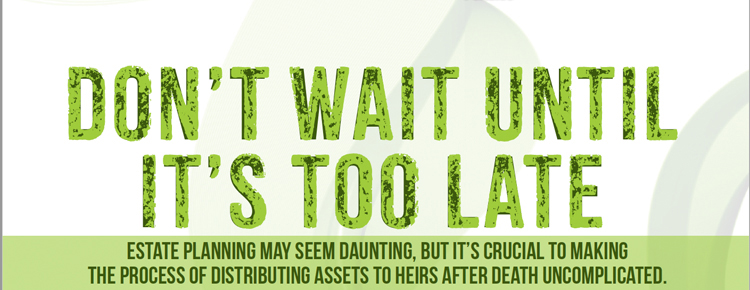 What do Prince and Aretha Franklin have in common with more than half of all adults in America? Like most Americans, neither megastar had a will, leaving friends and family with the arduous, expensive task of sorting out their estates.
What do Prince and Aretha Franklin have in common with more than half of all adults in America? Like most Americans, neither megastar had a will, leaving friends and family with the arduous, expensive task of sorting out their estates.
Lawrence attorney Matt Hoy, of Stevens & Brand, LLP, cautions the living not to do the same as these dearly departed dynamos did.
Whether it be a multimillion-dollar estate or simply the clothes on one’s back, Hoy emphasizes that almost everybody owns something, explaining, “(Writing a will) is an opportunity to create the property law for their property when they die, and that will becomes the law.”
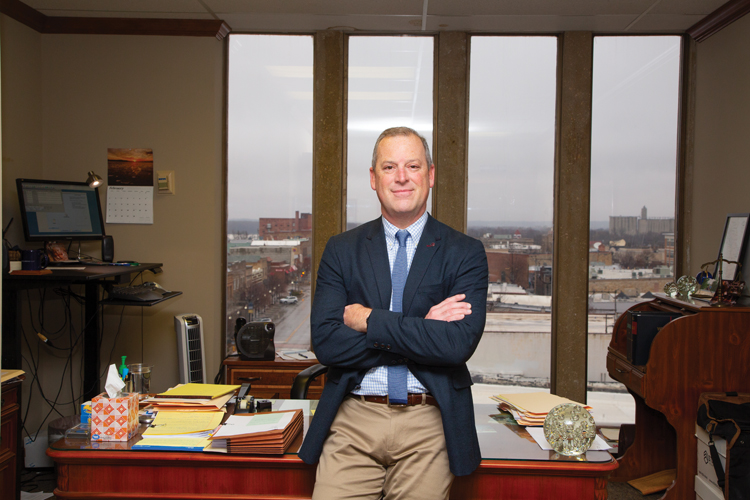
Matt Hoy, Attorney at Stevens & Brand, LLP
Hoy goes on to explain that without a will, the deceased’s property becomes subject to intestate succession, meaning a court-appointed administrator will be tasked to assess the value of the estate, pay off creditors and distribute the remaining property to the legal heirs according to state law.
Right now in Kansas, assets are distributed to the nearest relative(s) according to the following:
- • A married person with a surviving spouse and no children: Spouse receives 100%.
- • A married person with a surviving spouse and surviving children: Spouse receives 50%, children receive equal amounts of the remaining 50%.
- • A person with children but no surviving spouse: Children receive equal amounts of 100% of the estate.
- • A person with no children and no surviving spouse: The estate is divided in equal parts to the nearest surviving relative(s),such as parents, siblings, nieces and nephews, as applicable, depending on the deceased’s family tree.
This may be exactly what a person wants, but often a person’s circumstances and family dynamic at the time of death are a bit more complicated. Blended families, parents of children with special needs or complex ownership of shared assets, for example, can tie up an estate and a family for years, leaving survivors to manage far more than grief from the loss of a loved one without a signed will. Additionally, the process of even the simplest distribution is severely slowed when no legal directive exists.
Writing a will may seem daunting, but with careful thought and proper planning, it can be much more streamlined than most people fear. One of the first steps in the process is to determine which belongings, financial accounts, pieces of property and other items are part of your estate. The types of properties (land, art, collectible cars, CDs, stocks, etc.) and the total value will help determine the best way to allocate your estate.
Careful consideration needs to be given to selecting the executor of your will, which is the person who will oversee the execution of your plans after you pass, similar to the court-appointed administrator but chosen by the creator of the will rather than appointed by strangers according to law.
“Is it somebody you trust? Is the person responsible?” Hoy asks, emphasizing that no matter who you choose, you share your plans openly with your loved ones so there are no surprises after your death that may cause discord or confusion.
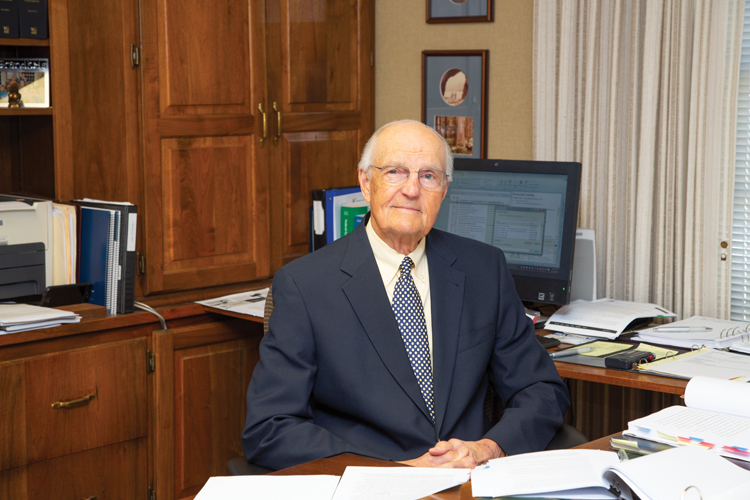
Richard Zinn, Attorney at Barber Emerson, LC
Be open with your attorney, as well, adds Lawrence attorney Dick Zinn, of the law firm Barber Emerson, LC, explaining, “Your lawyer cannot understand your planning needs unless you carefully think through your wishes and expectations, and communicate them not only to your lawyer but to others involved with your estate and financial planning.”
Zinn strongly recommends making your wishes known to a planning team, perhaps bringing your financial planner, CPA, attorney and others who are part of your current management team together to make sure everyone is aware of your wishes and plans.
Zinn also emphasizes that equal care should be given to selecting someone to act as power of attorney over one’s personal finances and health care. “The health-care power of attorney is a critical document because it describes not only who will be responsible for a person’s health-care decisions but also end-of-life issues.”
As time rolls on after signing these important documents, Hoy recommends checking in on them periodically, particularly after one of life’s “mile markers,” such as the death of a parent, the birth of a child or grandchild, or getting married.
“When there’s a significant occurrence, it’s appropriate to pull the documents out, dust them off and ask if this is still consistent with what you want, or have things changed?” Hoy explains.
Financial assets are not the only pieces of the estate, however. Sentimental items such as a wedding dress or photo album, and even the keepers of online accounts, digital information and social media passwords are important to formally delegate.
“Who do you want managing your Facebook or other social media accounts, as well as your other digital assets after your death?” Zinn asks.
A basic comprehensive estate-planning package, which includes a will, general power of attorney, medical power of attorney, a living will and assignment of guardianship for children (if needed) typically starts at roughly $1200 to 2000 locally, possibly higher for more complicated estate planning.
Kansas Legal Services, located in Topeka, may be able to offer assistance in planning, as well, particularly for parents of minors and senior citizens, at a reduced rate.
(Visit www.kansaslegalservices.org for more information.)
While a will may be the more widely known legal directive, there are other vehicles for estate management more and more people are using, including a traditional trust.
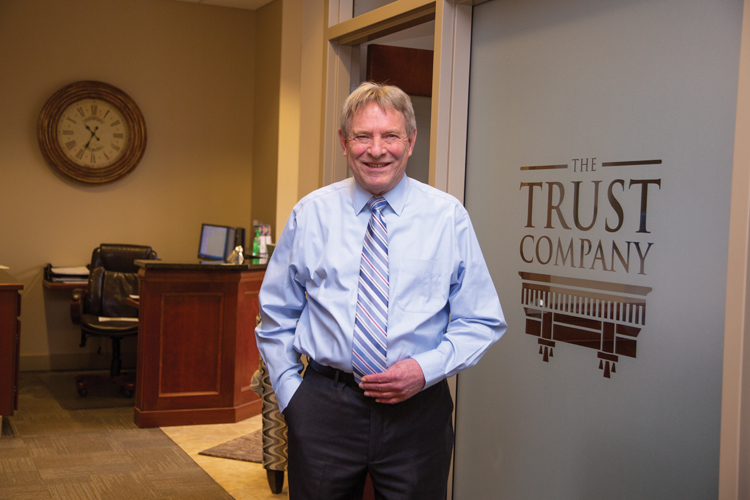
Mike Davies, Senior vice president and trust officer at The Trust Company
Mike Davies, senior vice president and trust officer with The Trust Company, smiles while explaining the origins of the trust.
“Trusts date back to medieval times,” he shares, “when, at the landowner’s death, all of his property was forfeited to the crown constituting the ultimate estate tax. A solicitor thought to himself, ‘What if I don’t own (my property)?’” The solicitor created a trust to own property with a trustee (similar to the executor of a will) to act under the trust contract so that the creator of the trust owned no property in his own right to be forfeited to the crown upon his death.
Roughy 800 years later, this solicitor’s idea works very much the same way. A person may opt to move all of his or her assets to a trust created by an agreement between the creator and the trustee. The trust owns the property, and the trustee dispenses money and allows the creators to live in and use the property as directed until the time of the creator’s death. The trustee then distributes the remaining estate according to the creator’s wishes expressed in the trust agreement.
Many may think of a trust as a tool only for those wishing to avoid estate taxes currently imposed on estates worth more than $11.4 million in 2019. “The modern trust, in and of itself, does not avoid estate tax,” Davies notes, but there are a number of other advantages to having a trust as opposed to solely having a standard will.
“A trust helps you avoid probate,” says Chris English, vice president and trust officer with The Trust Company of Kansas (TCK), “and if you become incapacitated while you’re alive, the trustee (similar to an executor in duties) can carry out your wishes.”
English explains that, while a will does save the survivors time, stress and money in distributing the deceased’s assets, a trust can do more than a will.
“A trustee acts on behalf of the grantor (the person who created the trust) in both life and after death following the wishes of the trust,” English says, while “the executor of a will has no power given to them by the document until the person has actually died.”
While a person is still alive, a trust can provide financial support to the grantor, and the appointed trustee can more smoothly transition to the role of power of attorney, if needed. After the grantor has passed away, the remaining survivors are able to bypass the costs and typical four-month delay of probate court all wills are subject to.
A living trust may also help prevent elder abuse by naming a successor trustee who may ensure assets are readily available to care for the grantor if and as he or she becomes in need of costly care.
A trustee may be a corporate fiduciary, such as a bank or a trust company, or it may be an individual, but the duties are extensive and possibly more burdomson than most individuals realize. Those interested in creating a trust should consider the duties imposed upon a trustee when deciding who to appoint.
Professional fiduciaries who have the power to act as trustees are trained to hire the necessary appraisers and agents to secure, value and sell property; collect and centralize money from various accounts; and disperse the assets accordingly. Sometimes the property can be unusual. English recalls one client who was a celebrity impersonator and left behind various costumes that needed to be valued and sold as part of the estate.
Trusts may be handed down through or even skip generations, commonly dissolving roughy 21 years after the death of the last named beneficiary.
Davies outlines several charitable options that are available, as well.
“Charitable unitrusts allow people to donate an asset such as land to a charity while living subject to a trust agreement with the charity,” Davies explains. He goes on to say that the named charity may then “direct an annual percentage of market value of the donated property to be paid back to the donor for a specific period of time, usually until his or her death.” With this sort of arrangement, the charity retains the residual value of the donated property for its own use.
The donor-directed accounts have become a particularly effective option since a 2017 change in standard deductions took effect. “A significant lump sum is donated up front to a donor-directed fund with an organization,” Davies says, allowing the money to be distributed to charities over the years according to the donor’s directives. Similarly, private foundations may be established to help finance charities at the direction of a board.
These and other charitable-trust options allow people to direct taxable assets to charities, helping the donor’s favorite charities while potentially providing a tax savings for the donor or the donor’s estate.
Hoy, Zinn, English and Davies agree that however a person decides to designate the estate, the most important thing the person can do is to talk openly about his or her wishes with loved ones.
For more specific information about estate planning, consult with an estate-planning attorney or a trust officer. A clear, thorough will and/or trust may be the most thoughtful legacy a person can leave behind.
Ask the experts:
What happens to my debt after I die?
Dick Zinn explains that debts incurred by the deceased are usually paid off with the money from the deceased’s estate. Secured debts (such as a mortgage) are paid off according to the terms of the agreement at the time the debt was incurred. Unsecured debts (such as cell phone bills, credit card bills, hospital bills) require more effort, with a burden of responsibility on the executor and/or trustee to publish a death notice and potentially reach out to known creditors after a person’s death. The creditor then has a finite period of time to file a claim and collect the money. If an estate’s value is less than the amount of debt owed, the remaining debt is written off. Zinn also notes that a 401(k), IRA (individual retirement account) and life insurance may be exempt from claims to creditors.
What is the best way to decide how much of my estate to allocate to a charity?
Mike Davies recommends working with a percentage rather than a dollar amount. A person may have an estate consisting of stocks, land and other assets subject to changes in value over time. For example, a $100,000 donation upon death to a charity may seem just fine when an estate is valued at $1,000,000 at the time a will is drafted, but if the value of the assets drops to $200,000 by the time of death, other heirs are looking at receiving only 50% of the inheritable amount as opposed to the 90% originally envisioned. By simply designating a percentage, you can guarantee a charitable donation and maximum inheritance will be left to everyone you care about. Davies adds that this can be designated in a will without the need for a charitable trust.
What else should I have besides a will?
Matt Hoy advises anyone aged 18 and older to have not only a will but general power of attorney, medical power of attorney, a declaration regarding dying wishes (sometimes referred to as a living will) and guardianship of minors (when applicable) in place. These documents allow parents or other designated loved ones to make decisions for an adult should that adult become incapacitated. He notes that physicians will not necessarily talk with parents regarding their adult child’s medical condition without this sort of legal authority to do so. While it may not be the going-away-to-college gift kids dream of, it is an important one to consider. Power of attorney documents may be downloaded from online legal sites, but Hoy strongly recommends consulting with an attorney prior to signing anything.
Do I really need to involve an attorney or trust company for this?
Chris English emphasizes that when any service is needed, whether it be the need to install a new toilet or secure the property of the deceased, it is always best to hire a professional. English and others in his industry are certified through trust schools of banking, having undergone rigorous training and testing to be able to maximize a person’s estate for decades after the person has passed; attorneys are trained and educated during three years of law school and required to pass the bar exam before practicing law. Friends and family may kindly be willing to serve in this role, but only a trained professional will be equipped to carry it out efficiently, thoroughly and with longevity.
A person’s final farewell.
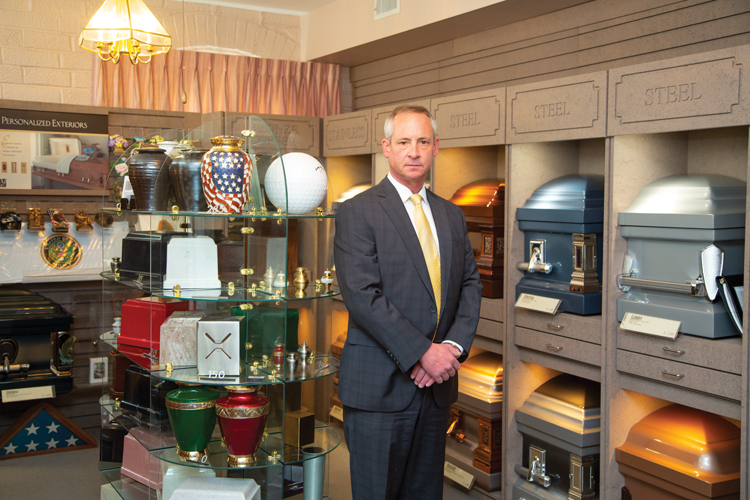
Bart Yost, Director at Rumsey-Yost Funeral Home and Crematory
When it comes to estate planning and management, a person’s final farewell is often the first order of business surviving loved ones are tasked with carrying out. This emotional and urgent step can be made much easier on family and friends by pre-arranging the funeral, yet a striking minority in the Lawrence area take advantage of this opportunity.
“I would say probably 20-25% pre-arrange their funerals,” says Bart Yost, Director at Rumsey-Yost Funeral Home and Crematory. Yost has worked for the family-owned business since 1978, serving as funeral director for the past 25 years, and has assisted countless numbers of people with funeral arrangements.
The cost can be intimidating, with full funeral packages in the area ranging roughly $6,000 – 25,000. Services may include everything from picking up the body of the deceased to embalming/cremation to the visitation, funeral, and burial. But in the end, pre-arranging can save the survivors time and money.
“When somebody comes in (to pre-arrange a funeral), we sit down and go through the service as if it were happening in three or four days, talking for 30-45 minutes about their wishes,” Yost explains of the process. “If they decide to pay for it then, they pay the current price.”
The payment is typically made through a pre-need insurance company, allowing a person to lock in that current price. When the person passes, Yost says, “We re-add the service at the time of need and any extra (funds) go back to the estate, and any overages are written off.”
Families may make changes to the arrangements with any additional purchases charged at the current rate. Yost has found many people opt to pre-pay for the casket and basic burial services, allowing the surviving family to make and pay for final arrangements for transportation, funeral, and additional services after their death.
The pre-pay option is most popular with people approaching retirement age and with people wanting to spend down their savings in order to qualify for skilled nursing care assistance. As Yost explains, “The state of Kansas will allow them to buy their funeral services and not count it against them as an asset.”
In addition to seeing people take advantage of the pre-pay option, Yost has noticed other trends in funerals in recent years.
“(The rate of) cremation is definitely rising,” Yost says, adding that cremation is typically about 35% less expensive than traditional burial. He also notes a decade-long trend for a full funeral with the body embalmed and in a rented casket and later cremated for private burial, with approximately 90% of traditional funerals involving an open casket.
With so many options available, Yost has a simple list for people to consider before they come in, including writing out a short outline of their lives with information others might not know about them but may be recognizable to others who read the obituary and to know their own finances and budget.
